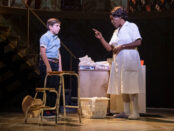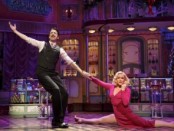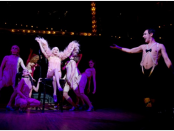Studio 54
Studio 54 was originally built as the Gallo Opera House in 1927 and transformed into the New Yorker Theatre in 1930. CBS purchased the space in 1942 and made it the home of renowned television shows like “The Johnny Carson Show.” CBS sold the space in the late 1970s, and the new owners transformed the space into the most legendary nightclub of the disco-era, Studio 54. The club closed in 1986 and became a venue for rock concerts until it eventually closed completely in the late 1980s. The space remained vacant until 1998, when Roundabout moved its landmark production of Cabaret into the neglected theatre-turned-studio-turned-nightclub. Today, Studio 54 is a permanent home for Roundabout Theatre Company.
Reteaming with O'Hara and book writer Craig Lucas for the first time since the 2005 Tony-award-winning "The Light in the Piazza," Guettel's hodgepodge of a score equates jazz with blithe inebriation and opera with soul-crushing regret, a mostly tiresome juxtaposition that includes the gobsmacking discordance of Kirsten drunkenly bebopping around her apartment while vacuuming it. That O'Hara is never less than luminous, coordinated, and note-perfect during this ill-conceived pas seul fundamentally captures what's wrong with the musical: it's much too beautiful. [more]
An Appreciation of Todd Haimes, Producing Artistic Director of Roundabout Theatre Company
Roundabout, under Haimes' leadership, was noted both for new works and for revivals of older shows with strikingly new elements (like this season's gender-bending revival of "1776.") He was the first producer to try livestreaming a Broadway show ("She Loves Me" in 2016). And somehow, besides producing lots of shows (and 11 Tony Awards), Haimes also found time to teach at Yale University and Brooklyn College. The biggest change he saw in theater in his career, he said, was the change in audience composition, with Broadway growing more and more reliant on tourists. He said it bothered him that nowadays, in his opinion, so many theater ticket buyers preferred to see crap so long as a star they knew from TV or film was heading the cast, than see a better play with better (but not necessarily famous) actors. [more]
Pictures from Home
"Pictures from Home," a stark, but eventually moving vision of a family, is based on the photo memoir of the same name by Larry Sultan. Sharr White, the playwright, has taken Sultan’s expansive volume of family remembrances and reduced its literary and visual extravagances to the size of the stage of Studio 54. The director Bartlett Sher and his colleagues have fashioned a microcosmic look at a mother, father and son, all hiding behind façades carefully sculpted over decades. That they are played by three terrific theater veterans—Nathan Lane, Zoë Wanamaker and Danny Burstein—helps spin this play into theatrical gold, an intimate, human-scale work that stands out in a season of blaring musicals. [more]
The Minutes
Tracy Letts’ "The Minutes" is both a fine political comedy as well as an indictment of how most Americans live today. It ultimately asks us to look at our values as well as our connection to the society around us. It will not make you so much as talk about it after you have seen it, but ask yourself if the indictment includes you. Continuing her connection to playwright Tracy Letts which began with "August: Osage County" in 2007, director Anna D. Shapiro adds another excellent contemporary play to her resumé. [more]
Caroline, or Change
"Caroline, or Change" is an important musical, more now than in 2004. It should be seen. The Roundabout production, though somewhat flawed, still communicates the complicated relationship between Blacks and Jews, clearly an issue in today’s New York City. It is an excellently constructed show, its message surviving mostly intact. [more]
The Sound Inside
On Broadway every once in a while writing, acting, directing and the technical production come together to profound, memorable effect. Adam Rapp’s "The Sound Inside" at Studio 54 is a superb example of this phenomenon. Originally staged at the Williamstown Theater Festival, the move to Broadway, and a much larger theater, works incredibly well. [more]
Kiss Me, Kate
While many of the greats have tackled Kate over the years ever since it premiered in 1948, O’Hara brings a subdued charm to the usually more boisterous part of Lilli, even if she is positively beaming when she first arrives on stage. The first was Patricia Morison, and the most recent on Broadway--before O’Hara--was the late Marin Mazzie, who received a Tony Award for the 1999 revival, as did the revival itself. And then there was Kathryn Grayson in the 1953 film version. [more]
The Lifespan of a Fact
In a time of fake news, these timely and topical questions are raised in the delightful new Broadway play "The Lifespan of a Fact," a dramatization by Jeremy Kareken & David Murrell and Gordon Farrell of the essay/book by writer John D’Agata and fact checker Jim Fingal, both who appear as two of the three characters in this play. Stars of stage and screen Daniel Radcliffe, Cherry Jones and Bobby Cannavale are having a field day in this amusing and provocative romp in roles that they have played before and are not too taxing but are played by them to the hilt. The fact that this is based on a true story adds to the piquancy of the play – although to be absolutely truthful the original editing job took seven years while only five days go by in the play. [more]
Children of a Lesser God
A regular on the television series "Dawson’s Creek" and currently appearing on "The Affair," the affable Joshua Jackson plays James. Mr. Jackson’s talents are not showcased in this production. Jackson’s speech pattern is monotonous and his lack of sensuality makes the attraction between him and Sarah less than palpable. He gets through the role with professionalism but with little impact. Others in the cast make up for this void but the vacuum of implausibility looms. [more]
Latin History for Morons
After his teenaged son is called a “beaner” by one of his classmates at a WASPy private school, Leguizamo is inspired to educate the rest of the United States about the overlooked achievements of Latin culture. This is done as a wild, stand-up comedy routine where the audience is directly engaged and occasionally heckled, and with a superior theatrical presentation. [more]
Sweat
"Sweat" is a classic, “well-made”--or carefully constructed--play, with a focus on the dwindling work for people in the middle of the country, prompting them to install Trump in the White House--to the ongoing dismay of the rest of the world. It couldn’t be more topical even as it helps us understand just exactly what’s been happening to bring us all to this sorry state. It was also based on Nottage’s extensive interviews with many actual residents of Reading, fueling the drama’s impact. [more]
She Loves Me
Scott Ellis’ direction avoids caricature, even in the most broadly drawn characters like the man-hungry Ilona, the gigolo Steven and the scared, but pragmatic clerk Sipos. He make the one touch of melodrama, involving Maraczek’s marriage, seem human and a touch tragic, helped by Mr. Jennings subtle, but exuberant performance. He also draws a tender performance from Ms. Benanti who gets to use the more operatic part of her marvelous voice. [more]
Thérèse Raquin
Roundabout Theatre Company has commissioned yet another new stage adaptation from British playwright Helen Edmondson, whose previous plays also include stage versions of Tolstoy’s "Anna Karenina" and George Eliot’s "The Mill on the Floss." In the title role, Keira Knightley who has been associated with period drama in her distinguished film career ("Atonement," "Pride and Prejudice," "Anna Karenina," and, of course, the "Pirates of Caribbean" movies) has chosen to make her Broadway debut. She is supported by Tony Award-winner Gabriel Ebert ("Matilda"), British actor Matt Ryan, and two time Tony Award-winning actress Judith Light ("Lombardi," "Other Desert Cities," "The Assembled Parties.") Unfortunately, director Evan Cabnet has chosen to stage this most French of tales in a bloodless, refined English style which doesn’t serve with the material well. [more]
An Act of God
This 90-minute intermission-less play is a comic and occasionally serious address to the audience by God who often sits on a large white couch as he revises The Ten Commandments. Some are kept and some are replaced by new ones during his arch analysis of human history. Angels Gabriel and Michael who also go out into the audience to take questions assist God. [more]
BROADWAY’S 2006 Fall/Winter Season
The White Way barely had time to recover from last season’s exciting Tony race when Martin Short roused the sleeping giant with his manic ode to himself, Fame Becomes Me. [more]
The Apple Tree
The best moment finds Chenoweth putting a torrid spin on "I've Got What You Want," and yet not quite able to master the cracking of a whip. It's pure silliness. In Passionella …, Chenoweth plays Ella, a lonely sooty chimney sweep, who is magically transformed by her fairy godfather (Kudisch, who also serves as the story' s narrator), into a blonde sex pot of a movie star. She is destined to find true love, however, with a rock singer (James). Chenoweth's talent for breaking through the sound barrier with her high notes is the highlight of this skit. Fans of Chenoweth will be delighted; others will find the triptych trying. [more]
The Threepenny Opera
The best way to imagine what has happened to the beggars, the bourgeoisie, the pimps and whores, and the sordid denizens of the underworld in this operatic rant on the evils of capitalism is to think of a Cirque du Soleil troupe on Valium and under neon (what was lighting designer Jason Lyons thinking?). Worst of all, it is plodding and dull and an eyesore thanks to Isaac Mizrahi's Halloween-on-Fire-Island costuming. [more]
Pacific Overtures
Weidman's book is especially clever in its anecdotal cohesiveness, and with additional material credited to Hugh Wheeler, will probably be thought of as more vindicated than it was initially. Yet one wonders if the sadness we feel as we watch the Japanese lose their will to resist American determination is actually compounded by the new ending that brings Japan into the modern age and includes an image of the bombing of Hiroshima. [more]



















